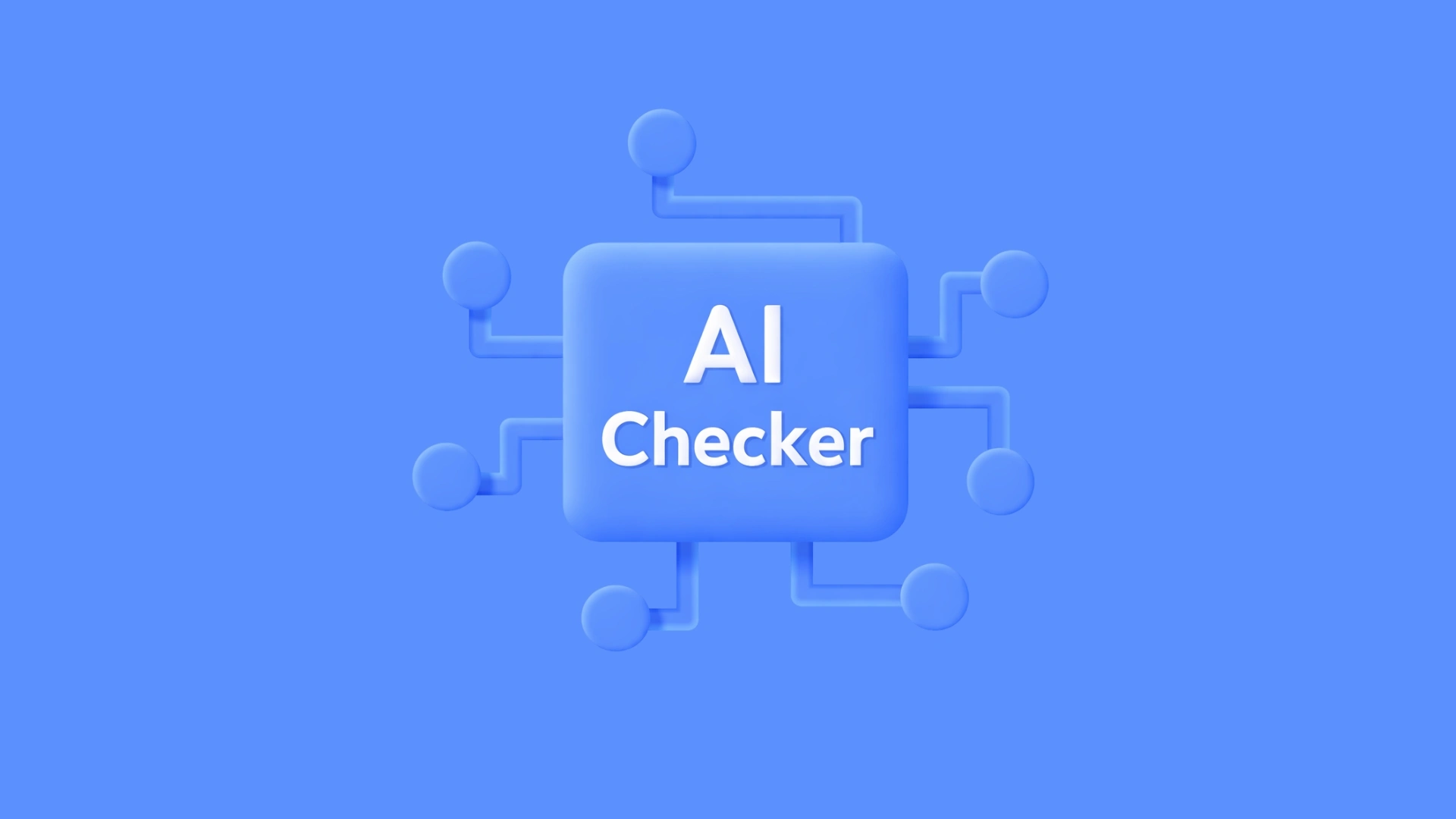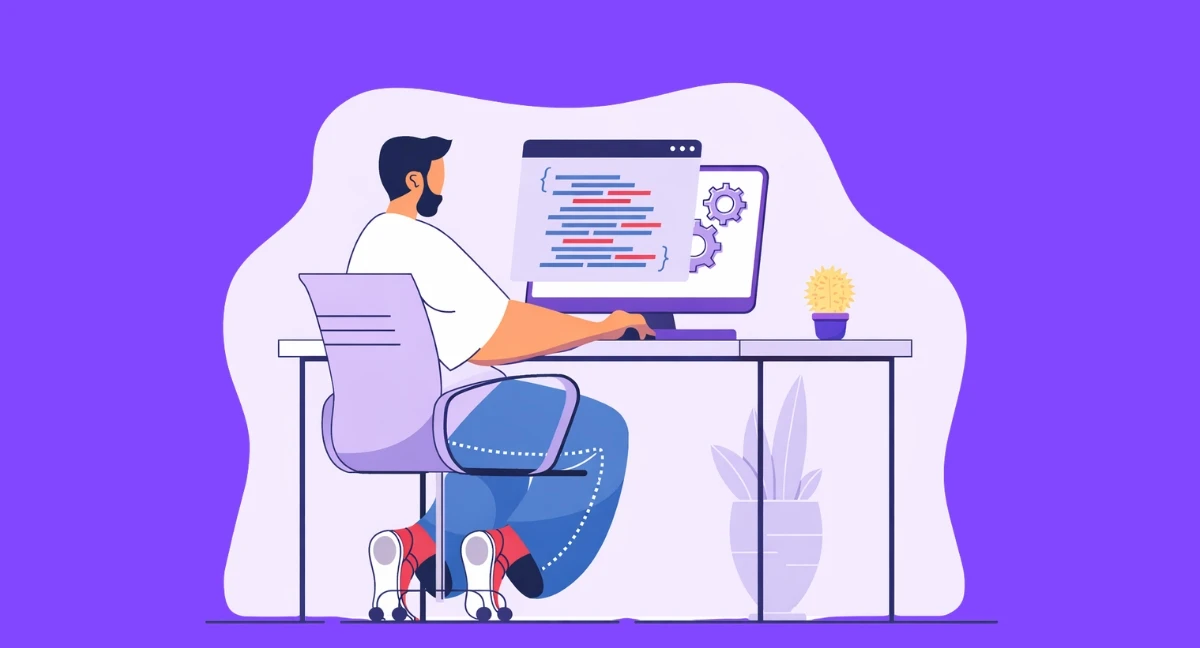Blockchain networks are powerful, but they struggle with one major problem: speed. When thousands of people try to use a blockchain at the same time, things slow down and fees go up. State channels offer a practical solution to this bottleneck. They let users complete transactions away from the main blockchain, which cuts costs and speeds things up considerably.
If you have been following developments in blockchain technology and how it works, you already know that every transaction on the main chain needs verification from the entire network. State channels change this dynamic by moving most activity off the main chain while keeping the same security guarantees.
Key Takeaways
- State channels move transactions off the main blockchain, recording only the final result on-chain to save time and money.
- Participants lock cryptocurrency in a smart contract before opening a channel, which acts as collateral and security.
- Off-chain transactions happen almost instantly and cost nearly nothing compared to on-chain transactions.
- Only the opening and closing transactions appear on the blockchain, while everything in between stays private.
- State channels work best for applications with frequent interactions between the same parties, like gaming or micropayments.
- Dispute resolution mechanisms exist to handle disagreements, though they require on-chain intervention.
Understanding State Channels in Simple Terms
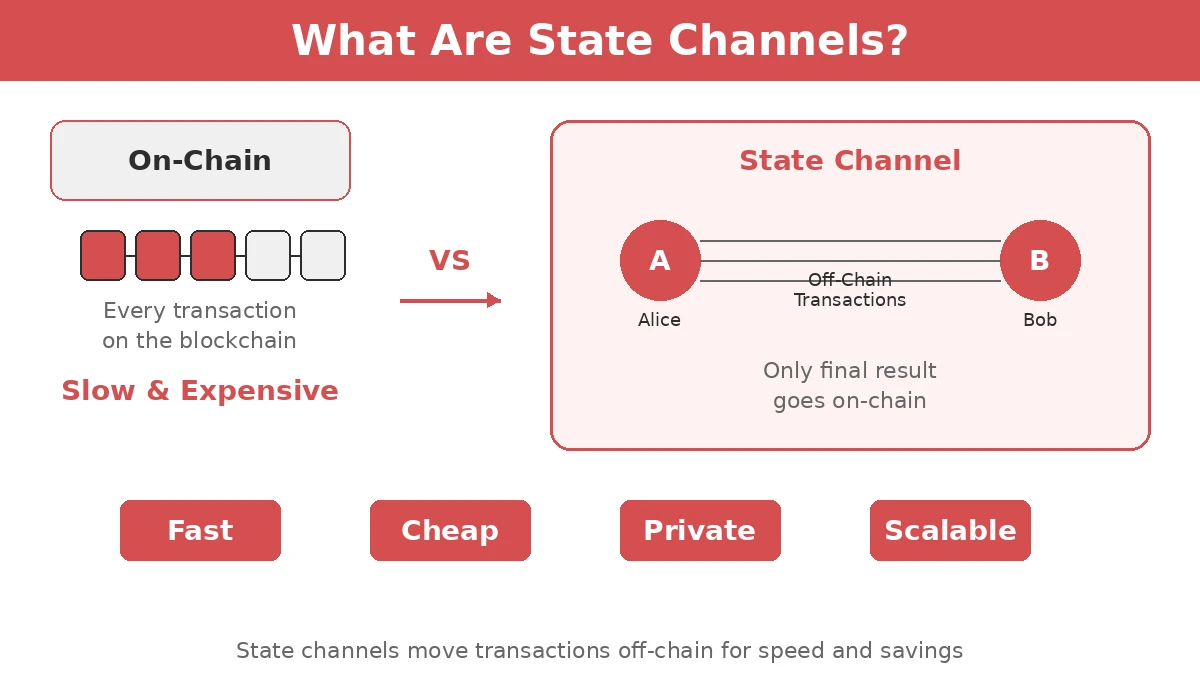
Think of state channels like running a tab at your local coffee shop. Instead of paying for each coffee separately with your card (which would mean processing fees every time), you open a tab in the morning and settle up at the end of the day. The coffee shop only processes one transaction, but you got five coffees throughout the day.
State channels work the same way on blockchain networks. Two or more parties open a channel by locking some cryptocurrency into a smart contract. Once the channel is open, they can send value back and forth as many times as they want. These transactions happen off the main blockchain, so they are fast and cheap. When everyone is done, they close the channel and the final balance gets recorded on the blockchain.
According to Wikipedia’s explanation of state channels, this approach allows blockchain networks to handle thousands of transactions per second between participating parties, compared to the limited throughput of on-chain transactions.
How State Channels Compare to Regular Blockchain Transactions
The difference between state channel transactions and regular blockchain transactions is significant. Here is a breakdown of how they stack up:
| Feature | On-Chain Transactions | State Channel Transactions |
|---|---|---|
| Transaction Speed | Minutes to hours depending on network congestion | Nearly instant (milliseconds) |
| Transaction Cost | Gas fees for every single transaction | Only fees for opening and closing channel |
| Privacy | All transactions visible on public ledger | Intermediate transactions remain private |
| Scalability Impact | Each transaction adds load to network | Minimal network impact regardless of volume |
| Security Model | Full network consensus for each transaction | Smart contract enforced with dispute resolution |
The Building Blocks of State Channels
State channels rely on several components working together. Each piece plays a specific role in making sure transactions are secure and fair, even though they happen away from the main blockchain.
Participants and Their Roles
The people or entities using a state channel must agree to participate and follow the rules. They sign each transaction with their cryptographic keys, which proves they approved the state change. Participants do not need to trust each other personally because the smart contract handles enforcement. However, they do need to stay online or have someone watch the channel on their behalf to prevent cheating.
The Channel Contract
A smart contract on the main blockchain acts as the referee. It holds the locked funds, defines the rules for valid state updates, and handles disputes if they arise. This contract is deployed once when the channel opens and interacted with again when the channel closes. The contract code is public and auditable, which means anyone can verify that the rules are fair before joining a channel.
State Updates and Signatures
Every time the channel participants want to change balances or data, they create a state update. This update includes the new state (like new balance amounts) and a sequence number that increases with each update. Both parties sign the update to show they agree. The latest signed state with the highest sequence number is what matters if someone needs to close the channel or resolve a dispute.
Settlement Process
When participants want to end their channel, they submit the final agreed state to the blockchain. The smart contract verifies the signatures and sequence number, then distributes the locked funds according to the final state. This cooperative close is quick and cheap. If both parties agree on the final state, settlement happens smoothly.
The Life Cycle of a State Channel
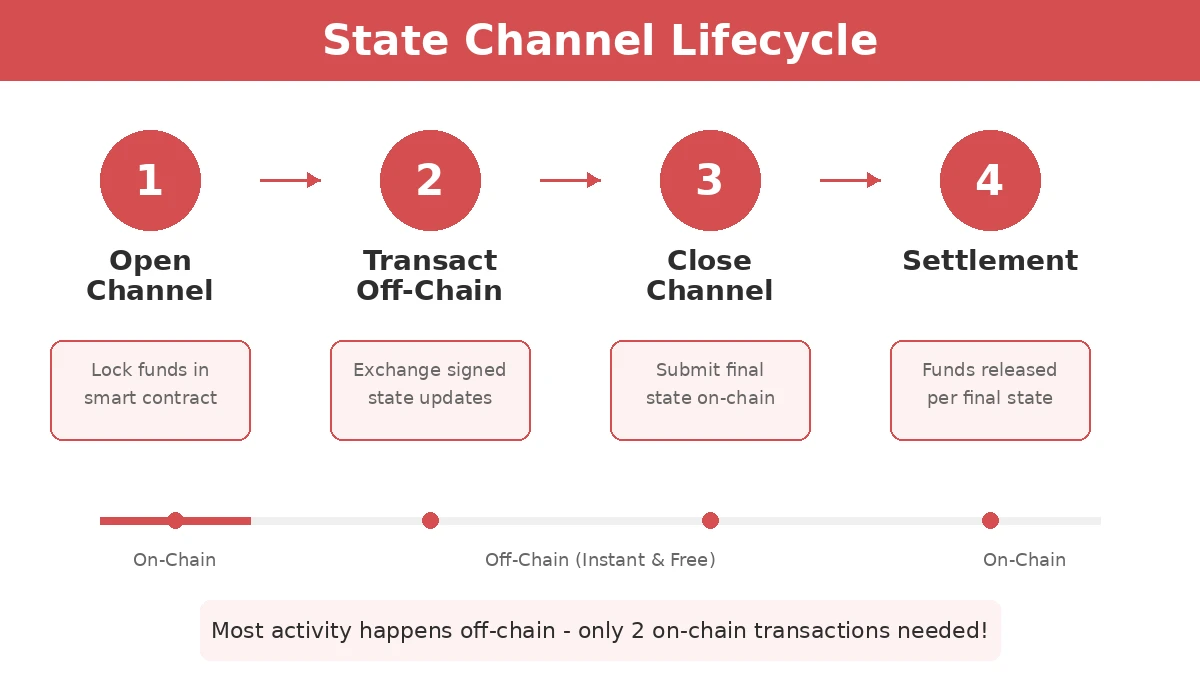
Understanding how a state channel moves from creation to closure helps clarify why this technology is so useful. Let us walk through each stage with a practical example.
Stage 1: Channel Opening
Alice and Bob want to play an online game that requires frequent small payments. They each deposit 1 ETH into a state channel smart contract. This on-chain transaction locks their funds and establishes the initial state: Alice has 1 ETH, Bob has 1 ETH.
Stage 2: Off-Chain Transactions
During the game, Alice wins the first round and should receive 0.1 ETH from Bob. They create a new state update showing Alice with 1.1 ETH and Bob with 0.9 ETH. Both sign this update with sequence number 1. Later, Bob wins and they create sequence number 2 with adjusted balances. This continues for hundreds of game rounds, all happening instantly with no blockchain fees.
Stage 3: Cooperative Closing
After the gaming session, the final state shows Alice with 1.3 ETH and Bob with 0.7 ETH. Both parties submit this final state to the smart contract, which releases Alice’s 1.3 ETH and Bob’s 0.7 ETH to their respective wallets. Only two on-chain transactions occurred: opening and closing.
Stage 4: Dispute Resolution (If Needed)
If Bob tried to cheat by submitting an older state where he had more ETH, Alice could challenge this within a challenge period by submitting the newer signed state with a higher sequence number. The smart contract would recognize the higher sequence number as the valid state and penalize Bob for attempting fraud.
Real World Applications of State Channels
State channels are not just theoretical. They solve real problems for specific use cases where their strengths shine. Any blockchain company working on scalable applications needs to understand where state channels fit best.
| Application | Why State Channels Work | Example Use Case |
|---|---|---|
| Gaming | Frequent small transactions between known players | Turn-based games with betting on each move |
| Micropayments | Paying tiny amounts would be impractical on-chain | Pay-per-article content streaming |
| IoT Payments | Machines need instant, automated transactions | Electric vehicle charging by the second |
| Financial Trading | High-frequency trades need speed and low costs | Decentralized exchange order matching |
| Supply Chain | Multiple updates between trusted partners | Real-time inventory and payment tracking |
Ready to Scale Your Blockchain Application?
State channels can transform your blockchain project’s performance. Get expert guidance on implementing off-chain scaling solutions that reduce costs and increase speed.
Benefits That Make State Channels Worth Considering
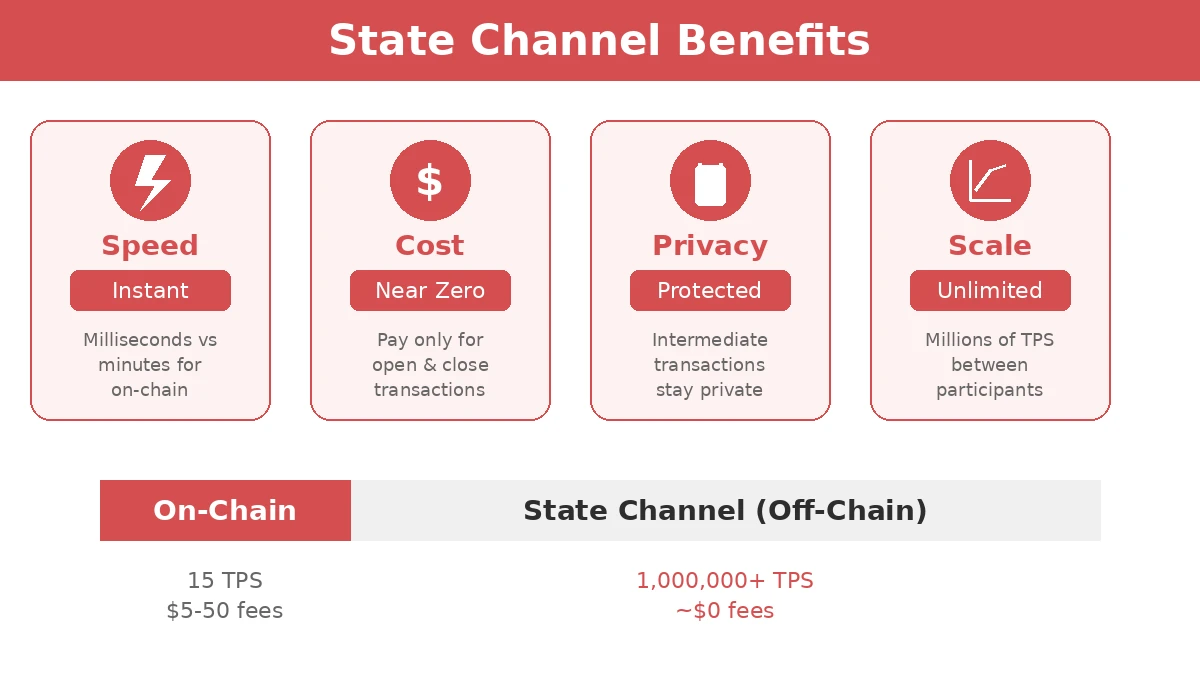
The advantages of state channels go beyond just faster transactions. They fundamentally change what becomes possible on blockchain networks.
Massive Scalability Gains: Because state channels handle transactions off-chain, they do not add to network congestion. A blockchain that can normally handle 15 transactions per second can support millions of transactions per second through state channels, since those transactions never touch the main chain until settlement.
Dramatic Cost Reduction: On Ethereum, gas fees can make small transactions economically impractical. Sending $1 might cost $5 in fees during busy periods. State channels eliminate this problem because participants only pay gas for opening and closing the channel, no matter how many transactions happen in between.
True Instant Finality: On-chain transactions require waiting for block confirmations. State channel transactions are final the moment both parties sign the update. This enables real-time applications that would be impossible with on-chain transaction delays.
Enhanced Privacy: Only the channel opening and closing transactions are visible on the public blockchain. Everything that happens inside the channel stays between the participants. This matters for business applications where transaction details should remain confidential.
Challenges and Limitations to Know About
State channels are not perfect for every situation. Understanding their limitations helps you decide if they fit your needs.
Collateral Requirements: Participants must lock up funds to open a channel. This capital sits unavailable for other uses until the channel closes. For users with limited funds, this requirement can be a barrier. The locked amount also caps the maximum value that can flow through the channel.
Liveness Requirements: Someone needs to watch the channel to prevent cheating. If a participant goes offline and cannot respond to a fraudulent close attempt during the challenge period, they could lose funds. This means users either need to stay online or use a watchtower service.
Limited Participant Scope: State channels work best between a fixed set of participants who interact frequently. Adding new participants requires opening new channels or using channel networks, which adds complexity. One-time transactions with strangers are better suited to on-chain processing.
Smart Contract Risks: The security of a state channel depends entirely on the smart contract code. Bugs in the contract could lead to lost funds or unfair outcomes. This is why having experienced developers audit and test channel contracts is critical.
For those wanting deeper context on blockchain’s journey to this point, the history of blockchain provides valuable perspective on how scaling solutions like state channels evolved from early limitations.
State Channels vs Other Scaling Solutions
State channels are one of several approaches to blockchain scaling. Each solution has different tradeoffs that make it suitable for different situations.
| Scaling Solution | How It Works | Best For | Main Tradeoff |
|---|---|---|---|
| State Channels | Off-chain transactions between fixed parties | Repeated interactions, micropayments | Requires locked capital and online presence |
| Rollups | Bundle many transactions into one on-chain proof | General purpose smart contracts | Some delay for finality |
| Sidechains | Separate blockchain linked to main chain | High throughput applications | Different security model than main chain |
| Sharding | Split blockchain into parallel pieces | Network-wide scaling | Complex implementation |
Getting State Channels Right Requires Experience
Implementing state channels is not a simple plug-and-play task. The smart contracts must be carefully designed to handle edge cases, dispute scenarios, and potential attack vectors. The off-chain infrastructure needs to reliably exchange and store state updates. Integration with existing systems requires deep blockchain knowledge.
Nadcab Labs brings over 8 years of hands-on experience in blockchain development, including designing and deploying state channel solutions for clients across gaming, finance, and enterprise applications. Their team has worked through the complexities of collateral management, watchtower services, and dispute resolution mechanisms that make state channels reliable in production environments.
What sets experienced teams apart is knowing which situations call for state channels and which do not. Sometimes a different scaling approach fits better. Sometimes a hybrid solution combining state channels with other techniques delivers the best results. This judgment comes from years of building real systems and learning from what works in practice.
The Future of State Channels
State channel technology continues to evolve. Researchers are working on virtual channels that let users transact without having a direct channel between them, routing through intermediaries similar to how the Lightning Network operates for Bitcoin. Generalized state channels that can run arbitrary smart contract logic off-chain are becoming more practical.
As blockchain adoption grows, the demand for scaling solutions will only increase. State channels will likely become a standard part of the toolkit for any serious blockchain application that needs speed and efficiency. The projects investing in this infrastructure now will be well positioned when mainstream adoption arrives.
Frequently Asked Questions
If a participant goes offline, the other party can still close the channel by submitting the last signed state to the blockchain. A challenge period allows the offline party to come back and dispute if needed. However, if someone stays offline during an attempted fraudulent close and misses the challenge window, they risk losing funds. This is why many implementations use watchtower services that monitor channels on behalf of users who cannot stay online constantly.
The amount you lock determines the maximum value that can flow through the channel. If you deposit 1 ETH and your counterparty deposits 1 ETH, the channel can handle transactions totaling up to 2 ETH between you. You should lock enough to cover your expected transaction volume plus some buffer. The locked funds remain fully under smart contract control and are returned when the channel closes according to the final agreed state.
State channels can technically work on any blockchain that supports smart contracts with the necessary functionality. Ethereum has the most developed state channel ecosystem with projects like Raiden Network and Connext. Bitcoin has payment channels through the Lightning Network, though these are more limited in functionality. Other smart contract platforms like Polygon and Arbitrum also support state channel implementations with varying levels of tooling available.
Transactions inside a state channel are only known to the participating parties and are not broadcast to the network. Only the channel opening and closing transactions appear on the public blockchain. However, observers can see that a channel was opened between specific addresses and can see the final balance distribution. They cannot see what happened in between. For stronger privacy, some implementations combine state channels with additional privacy techniques.
Payment channels are a specific type of state channel designed only for transferring value between parties. State channels are more general and can handle any kind of state change, including complex smart contract logic like game moves or data updates. Think of payment channels as a subset of state channels. The Lightning Network uses payment channels, while generalized state channels can run entire applications off-chain with only the final result settled on the main blockchain.
Opening a state channel requires one on-chain transaction per participant to deposit funds, which takes as long as any normal Ethereum transaction, typically a few minutes depending on gas price and network congestion. Closing cooperatively also requires one transaction. Disputed closures take longer because of the challenge period, which can range from hours to days depending on how the channel contract is configured. Once open, transactions inside the channel are instant.
Reviewed & Edited By

Aman Vaths
Founder of Nadcab Labs
Aman Vaths is the Founder & CTO of Nadcab Labs, a global digital engineering company delivering enterprise-grade solutions across AI, Web3, Blockchain, Big Data, Cloud, Cybersecurity, and Modern Application Development. With deep technical leadership and product innovation experience, Aman has positioned Nadcab Labs as one of the most advanced engineering companies driving the next era of intelligent, secure, and scalable software systems. Under his leadership, Nadcab Labs has built 2,000+ global projects across sectors including fintech, banking, healthcare, real estate, logistics, gaming, manufacturing, and next-generation DePIN networks. Aman’s strength lies in architecting high-performance systems, end-to-end platform engineering, and designing enterprise solutions that operate at global scale.



